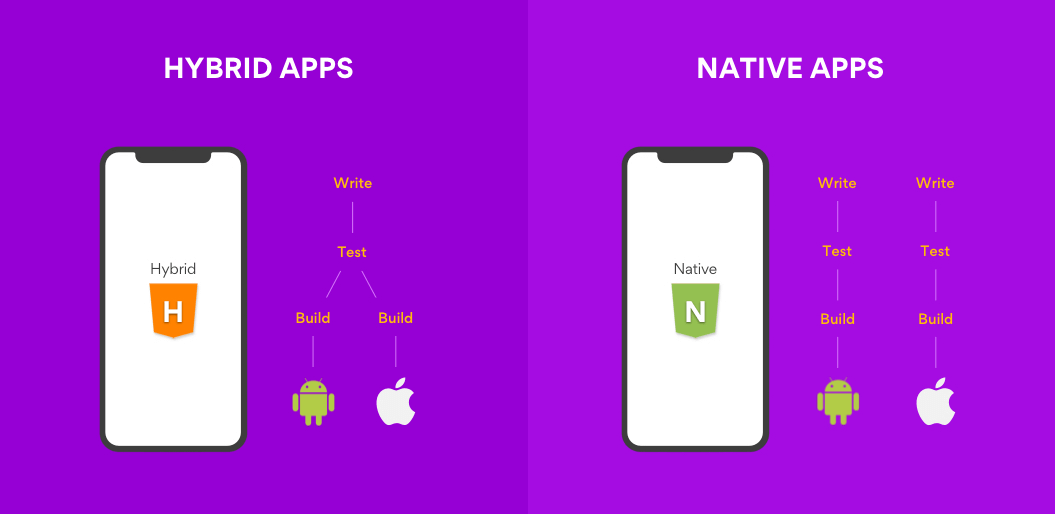For a seemingly inconspicuous gadget, smartphones pack quite a punch. They were once a fast, reliable, and portable solution to telegrams and telephones. But now, loaded with a host of applications, they serve every conceivable purpose.
Businesses and consumers alike can leverage the benefits of mobile applications. From shopping, mobile banking, and in-app bookings to user engagement, brand marketing, mobile apps offer abundant possibilities.
But when considering mobile app development, one question stumps entrepreneurs worldwide: native apps or hybrid – which would be the best choice? It’s one of the most puzzling decisions that influence the growth of a company.
The answer depends on your business requirements, budget, timeline, app’s purpose, and more. Many decisions must be made when you go into app development.
Native and hybrid apps have their strengths and weaknesses, and regardless of the niche, each company has its distinct objectives. So, while one option may work for a rival brand, it may not be the right decision for you.
So, let’s get into the primary differences between native and hybrid apps that you should know to decide which direction is best for you:
Hybrid Apps Vs. Native Apps: What’s the Difference?
Native apps are specific to the platform for which they were built. They use programming languages compatible with one operating system, making them ‘natives’ to the OS.
The apps feature separate codebases, enabling them to perform optimally on their specific operating system and leverage device features such as camera, GPS, and more.
Furthermore, native apps follow OS-specific UX guidelines, ensuring fast performance and an unmatched user experience. It forces developers to keep the user interface straightforward and consistent for all native apps on the device, making it convenient for the user.
Conversely, hybrid apps are websites neatly wrapped in a native wrapper.
Hybrid app development is primarily a combination of native and web app development. Hybrid apps are built using HTML, CSS, JavaScript, and other web programming languages. But unlike conventional websites, they are available in the app stores and can be installed on the users’ phones.
Additionally, hybrid apps aren’t specific to one OS, unlike native apps. One hybrid app is compatible with multiple operating systems, including Android and iOS.
That makes you wonder, how do these differences impact businesses? What are their pros and cons, and how do they relate to your objectives? Here’s how these distinctions matter:
Pros and Cons of Native App Development
Pros
- Since native apps are optimized specifically for each OS, they are intuitive and offer better usability than hybrid apps.
- Native apps offer faster performance as they are built specifically to the OS requirements.
- Unlike hybrid apps, native apps can function with limited or no internet connection, making them accessible anywhere and at any time.
- Native APIs allow the apps to access device features, improving app functionality significantly.
- Native app developers have access to diverse resources and tools, making app maintenance convenient.
- Since native apps follow the strict design guidelines of the specific OS, they gain approval from app stores relatively quickly.
Cons
- Native apps require expert skills and experience, so you’ll need developers specializing in Android or iOS app development.
- The development process for each is separate, so if you are developing an app for Android and iOS, you require twice the effort, time, and budget.
- Separate codebases make it challenging to release updates across all platforms simultaneously.
Pros and Cons of Hybrid App Development
Pros
- Hybrid app development doesn’t require expertise in multiple technologies, making it faster and convenient for in-house developers.
- With one codebase compatible with multiple devices, hybrid app development is faster, more cost-efficient, and easy to maintain and upgrade.
- Multiple platform compatibility also means access to a global audience as the app is available in both app stores.
- The single codebase allows developers to ensure the app has an identical interface across all platforms.
Cons
- While multiple platform compatibility allows faster development, it takes away from the app’s usability.
- They are relatively slower than native apps and can’t leverage device features completely without native plugins. It affects the development time and the app’s user experience.
- Extensive customization of app features may require native coding to support the app on each platform, increasing costs and reducing the perks of hybrid app development.
- With every release from Google or Apple, it takes time for hybrid developers to update the app to support the new feature.
- Hybrid apps depend on various libraries and frameworks to run on multiple platforms. They must be in sync with the latest OS versions to provide a native-like user experience.
Native Vs. Hybrid Apps: Is There a Wrong Answer?
Knowing the pros and cons, you might wonder which is the right choice. But there is no right or wrong; your answer depends on the app’s requirements, your business goals, budget, and more. Some of the factors that affect your decision include:
- App complexity
- Timeline
- UI/UX design
- App’s purpose
- Features
- Cost
A hybrid app is worth it is when you have a tight deadline, a limited budget, and need to validate your idea. Otherwise, it’s best to develop a native app.
That said, you need to question whether you need an app on both platforms immediately. If not, then why rush the decision?
It was two years before Instagram was available to Android users. So, if Instagram can stick with one platform for two years, you can also take the time to consider your choices and opt for the one that targets your primary audience first.
Understanding the differences between native and hybrid apps will help in deciding the best fit for you. But if you still have questions, consult with a professional software development company like Logiciel Innovation in the US.
If you define your business objectives clearly, experienced developers can help in decision-making, map out the best plan, and bring your idea to life.
also check Yes, There Are Quality And Affordable SEO Services.













